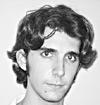Hundreds of images flitter into my mind when I hear “Michael Jackson.” The phrase conjures so many images and thoughts that it is less of a proper noun and more of a sentence.
The American public agrees. Three specials featuring Jackson aired within the same week, rightly garnering high ratings. A strong dash of Jackson is the perfect antidote to pre-war anxiety. His character is the ultimate in escapism, and fantastic in proportion; he lives with children in a ranch called Neverland, where music oozes from speakers hidden in rocks. In one pale hand rests a great black umbrella; the other holds the hand of a small child. He rides his train often with his child-friends, laughing and pointing at the wildlife and scenery littering his huge estate. He is a cross between Willy Wonka, Mister Rodgers and death, and we will never get enough of him.
Michael Jackson’s ever-changing face — a phantasmagoria of shades and shapes he claims he altered only twice to make his voice “clearer” and “to hit higher notes” — became the center of the “Michael Jackson Unmasked,” a two-hour NBC “Dateline” special. It is truly American to profit from creating such a character as Michael Jackson and then profit again once he becomes a laughingstock. Jackson is a pure symbol of the cultural failures of our society — he mangled his body in a catastrophically unsuccessful attempt to become more beautiful.
At the same time as the NBC “Dateline” special, ABC ran “Living With Michael Jackson,” a British documentary that followed journalist Martin Bashir as he lived with and interviewed Jackson for eight months. Documentaries always highlight a certain dominant opinion, and the methods Bashir used in “Living With Michael Jackson” are not necessarily atypical. Bashir iterated his belief that Jackson was a danger to his children multiple times and used his interview opportunities to quiz Jackson on his face, his strange relationship with children, and his relationship with the world outside his Neverland ranch.
Only Fox would run Jackson’s rebuttal to “Living With Michael Jackson,” and only Fox would name the special “The Michael Jackson Interview: The Footage You Were Never Meant To See.” The special cast a demeaning glow on Bashir, depicting him as a self-serving tabloid journalist patiently waiting for something bizarre to spill from Jackson’s mouth. Bashir’s unabashed bootlicking proved effective, though. By giving Jackson compliments on his relationship with his children (he once said that seeing Jackson with his kids almost makes him “weep”), Bashir elicited Jackson’s trust.
Just because Bashir was not the most upstanding journalist does not mean Jackson is a saint. Bashir’s documentary was not a character assassination. People used to take Michael Jackson’s title of “King of Pop” seriously.
Perhaps it was Jackson who ordered a hit on himself years ago when he made his video game debut in “Michael Jackson’s Moonwalker.” In the game, Jackson must use his pop-star powers to shoot fairy dust and eliminate his opponents to rescue his 10-year-old friends. Jackson’s dance moves devastate powerful street thugs and criminals determined to stop him. His special move consists of hypnotizing his opponents into dancing until they die from exhaustion. One must be careful around Jackson’s enemies, though — Jackson bleeds magical sprinkles when he is damaged. The game also features his pet chimpanzee, Bubbles, who to this day resides at Neverland ranch and uses Jackson’s toilet when nature calls.
Michael Jackson is a question of absurdity. He is an enigma of incredible proportions. With a life as his is, could he actually ever be happy? With a ruined body, a demolished reputation and more money than he could ever spend, is he not one of the world’s most tortured souls? Bashir gave thought to the same question. When asked whether he enjoyed life or not, Jackson gave a sad reply. “I enjoy it behind my gates,” he said. “I’m Peter Pan in my heart.”
Jackson shown as pitiable
February 24, 2003

Seeking out a different view





